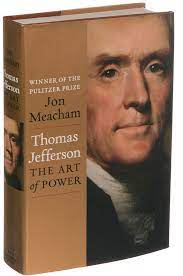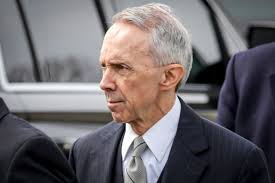Thomas Jefferson - President
Thomas Jefferson – President
Jon Meacham’s Thomas Jefferson: The Art of Power is a book
that casts light on a rather complex man. Past historians didn’t view Jefferson
favorably. Some thought among other things, he was paranoid about his ideas of the
British monarchy. Meacham corrected this view, admitted that Jefferson had
faults, but felt he still had to be ranked as one of America’s great presidents.
In his early life Jefferson attended the College of William
and Mary in Williamsburg. There he was educated and was known for his love of
the English classics. He learned Greek, Latin, and French, and became versed in
ancient philosophy. But on graduation he sought a political life, and was
elected to the House of Burgess. Jefferson became prominent in Philadelphia,
and active with the American colonies break from Great Britain. He was
instrumental in writing the Declaration of Independence. Jefferson was later
governor of Virginia at the time of the American revolution.
Jefferson was Secretary of State during the presidency of
George Washington. John Adams was Washington’s vice president. Alexander Hamilton
was Secretary of Treasury. But Jefferson was on a collision course with
Hamilton. When Washington retired Adams became president. Jefferson was against
the administration’s Alien and Sedition Acts. He was always fearful that America’s
newly independent nation would revert to monarchical rule.
In the next election when Jefferson became president Aaron Burr,
his vice president was always a problem. (He killed Hamilton in a duel). Jefferson
pursued a Republican agenda. The Federalists under Adams had packed the courts
with justices so, Jefferson did what he could to alleviate this situation. While
in office he was living in Washington DC, and away from his home at Monticello.
Jefferson was known to have an ongoing relationship with his slave Sally
Hemings since his days in France as an ambassador.
The next election when Jefferson was again the victor he
was faced with other problems. There was an attack on the USS Chesapeake that
roiled the nation. There was a fierce debate whether America should go to war
with the British. There was also good news for Jefferson with the Louisiana
purchase from France that increased the size of the nation. Still, like it was before,
there was talk about secession of the Northern states. The Louis and Clarke
expedition to the Western seaboard was promising for American interests. But an
American embargo caused problems, and Americans had difficulties making the
necessary adjustments.
In retirement Jefferson moved to Monticello. He was able to
supervise his slaves, read, wrote letters, build, and took horseback rides. His
pet project was the establishment of the University of Virginia in
Charlottesville. Jefferson died on July 4, 1826 on the 50th
anniversary of the America’s independence. It was also on this same date that
John Adams also died with whom he had been able to renew their friendship.




Comments
Post a Comment